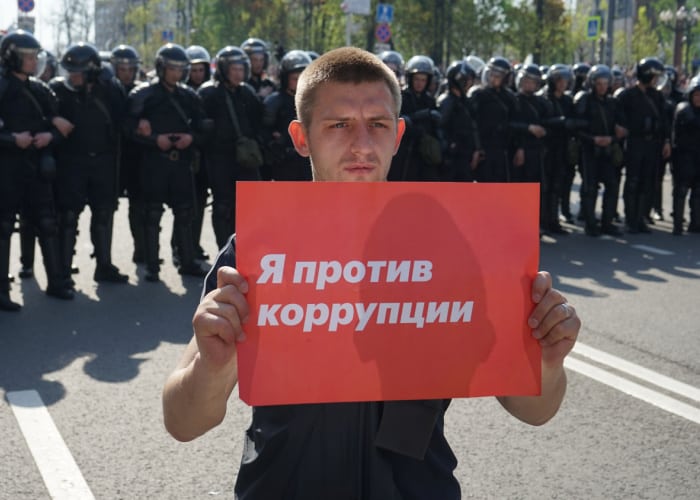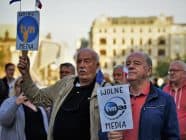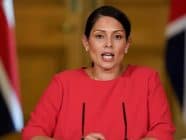
A man stands with a red poster “I am against corruption” during a 2018 protest in Moscow, Russia. Photo by Shutterstock
In October, a group of determined experts committed to combating corruption in Russia launched the “Transparency International – Russia in Exile”. It was the rebirth of Transparency International-Russia, a branch of the global anti-corruption watchdog Transparency International (TI) that was forced to liquidate itself after being added to the Russian Prosecutor General’s Office’s list of “undesirable” organisations.
Ilya Shumanov, Deputy Director of the relaunched organisation, is part of the team that was forced to leave the country in order to continue their work of “defending the principles of transparency, accountability, integrity and honesty”.
In an interview with Johanna Mack, Editor of the German European Journalism Observatory website, he talks about how Transparency Russia’s work, topics and strategies have changed since the start of the war in Ukraine and how the organisation continues to bring investigative research to the public.
Tell us about the work you did before you left the country.
“We were designated as a foreign agent in 2015. It was one of the first cases of a nonprofit organisation receiving this designation. So, even before the beginning of the war in 2022, we were not able to do a lot in the field of government advocacy. We weren’t allowed to join the government’s public councils or even invited to some official meetings. There was also an official restriction for Russian government representatives and public officials to avoid contact with us because we were a “foreign agent organisation”.
“So, instead, we focussed on using digital platforms that allowed people to participate in the public, non-governmental control of officials through declarations, such as the disclosure of their income. Our lawyers also supported people in court cases about corruption in the local authorities. And we did a lot in the field of education and enlightenment. We had several platforms and collaborations with stakeholders, such as students, civic activists, and local grassroots initiatives, representatives, and professionals, to help us spread the word about anti-corruption.
“A unique feature that not every Transparency International chapter has is investigative reporting. We were doing investigative journalism on complicated money laundering schemes, transnational corruption, illicit financial flows, etc.”
How did this change when the pressure on Transparency International Russia increased?
“We shifted our focus to working with communities and businesses. Businesses are more open to changes, especially those trying to avoid the sanctions by US authorities in 2021. Some were trying to distance themselves from the government to comply with global anti-corruption regulations and to take actions to avoid being blacklisted by the EU or US authorities.
“In the context of the war, of course, we had to change a lot. We had to step away from the government. We are no longer able to do any consultation or collaboration with them. We had to spend a lot of resources, time, and capacity trying not to be shut down. People are dying now, today. People were dying yesterday, and more will probably die tomorrow. So, it’s tougher to concentrate Russian society and any stakeholders on corruption during the war.”
How are you organising your work in exile?
“The relocation process is a big deal. If you are trying to relocate yourself in a personal capacity, it’s one thing. If you’re trying to relocate a team with family members, dogs, visas, children, etc., it’s a nightmare. There are a lot of housing problems, plus the everyday practicalities such as opening bank accounts. These activities take time that we should spend on anti-corruption. We also had to recruit staff members as some members of our team could not relocate, and we had to find a way to keep morale high.
“The next issue was the designation as an undesirable organisation this spring. This status means we had to shut down everything that we had built in Russia over the years to avoid legal consequences such as criminal accusations and fines.”
How are you able to continue your work with these challenges?
“COVID-19 was a chance to learn how to work remotely. During lockdowns, we were able to find a way to communicate securely and support each other while working online. I suppose it would have been more challenging if we had not learned to work remotely.”
How do you access sources and information? Do you have to do all your data collection online now? Do you still have people on the ground?
“On the one hand, it’s impossible to continue the work without being on the ground. The big thing in our team is using public sources of information like open-source intelligence tools to collect data. For example, we have big data analytics in our team, programmers, and IT guys who can collect data through AI.
“And, of course, we still have some relevant people on the ground in different regions of Russia with different backgrounds who help us. In 2021, we started to build our community, and there were plenty of in-person events. Even during the war, in 2022, I did a number of trips through Russia, from Kaliningrad to Vladivostok, visiting people on the ground to understand more about the atmosphere in the regions, the context they are facing, and also trying to do some events, to collect data and sources. To avoid risk, some of our projects continue in Russia but under different brands.”
Does losing the Transparency International branding on the ground hinder your work?
“It depends. It’s tougher to connect with journalists because we are now acting non-branded on the ground. On the other hand, it is easier to continue some groundwork with activists and grassroots initiatives when we are not designated as a foreign agent or an undesirable organisation. But safety and security continue to be the big challenge. Of course, we are thinking about this and cutting our ties with those who don’t want to take certain risks.”
Is there any way that Transparency International can support you in this situation?
“Yes, we have full support from the Transparency International movement. I think the organisation understands that these challenges will become more and more common in the future. Russia is not the only country in the hands of dictators. Maybe about half of the countries globally show signs of dictatorship or authoritarian regimes. That means we must be more flexible, working remotely, outside the country, if necessary, to try to find some remedy to these challenges.”
Currently, are you still able to reach audiences inside Russia?
“We are still working for the people in Russia. Of course, it’s tougher to deliver some information. We know that some of them are not using VPNs, for example. We are trying to respond to this challenge by using social media, partnerships and marketing strategies. Just a few months ago, we did some anti-corruption campaigns in Russia without branding them as Transparency International. And, of course, we had worked on a communications strategy in 2021, and the digital platform was effective and transformational.
How did the risks, restrictions, and remote and digital working affect your content?
“We are refocusing our work on the sanctions – not to advocate for them but to try to explain how they work and how illicit flows of finance changed since the beginning of the war. We are also seeing the development of new topics like cryptocurrency and how Russian authorities, criminals, and kleptocrats are using crypto payment systems in Europe and the United Kingdom to avoid sanctions and transfer their dirty money outside of Russia to continue their criminal operations.
“We are still trying to answer some unanswered questions about the death of the oil and gas company’s top managers. We have published a new investigation in Novaya Gazeta Europa about the connection between the death of top managers of Gazprom and money laundering. Then, we are trying to investigate how Russian authorities nationalised some private companies. We will publish a report about the connection between war and corruption, how the war affected corruption and how corruption affected the war.”
How has your work contributed to global information channels?
“There is a huge demand for our expertise from Transparency International chapters all over the world. For example, from the UK, the Czech Republic, some African countries, Australia, and South Asia. There are plenty of chapters with whom we are in touch and with whom we are trying to do some joint work, like tracing assets or providing expertise. For example, I have a request from colleagues in the United Kingdom about Russian oligarchs who have property in the country.”
Being named a foreign agent and being associated with an undesirable organisation, are you safe working in exile?
“Look, I grew up in the 80s in Russia. It was not a very safe place and safe time. Some early challenges prepare you to be ready for any challenges. These designations are also a seizure because some Russians decided to distance themselves and their media, businesses, societies, and communities from me because of unknown risks. We don’t know how the government will react to any corporation, financial transfers or events.
“The main issue and the main question for me is how the other governments react to Russians with this status. I see plenty of approaches. From my personal point of view, one of the biggest challenges is that you are trying to promote democracy and fight for human rights in Russia, but you are not able to secure a visa to attend meetings in Brussels. It’s a nightmare for several Russians who are outside of Russia. Receiving money, legitimately and legally, is a nightmare for those who are still in Russia. We need support from European countries and governments, but also from civil society and businesses.”
Opinions expressed on this website are those of the authors alone and do not necessarily reflect or represent the views, policies or positions of the EJO or the organisations with which they are affiliated.
If you liked this story, you may also be interested in: The new tool helping outlets measure the impact of investigative journalism
Follow us on Facebook and Twitter.
Tags: Corruption in Russia, Press freedom, Russia/Ukraine war, Transparency International












































